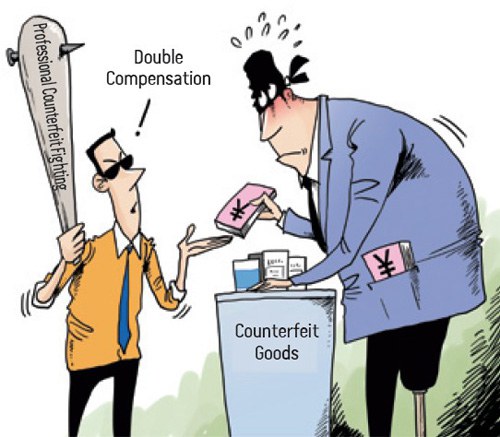|
 |
|
(CFP) |
Between August and October 1996, Wang bought a total of 23 trafficked Sony cordless phones from several shopping malls in Tianjin and sued all of them in different courts for selling illegal merchandise after his compensation requests were denied by the malls.
While Wang won an earlier case demanding compensation for five phones, he was denied compensation in a later case involving two phones.
The ruling of the Hebei District People's Court said that Article 49 of the Consumer Rights Law could not be invoked as the plaintiff's purchase of as many as 23 cordless phones within a matter of less than 40 days was not to meet his own daily needs as he purchased them willingly while aware of their illegal status.
Other professional counterfeit fighters have been encountering similar defeats at courts since the second half of 1997. Nationwide, judges in different provinces have different understandings over the status of professional counterfeit fighters and try cases according to their own standards.
However, professional counterfeit fighters might experience a change to their careers as of January 9, with the issuance of a judicial interpretation that aims to provide more protection for food and drug consumers by the Supreme People's Court (SPC), China's highest judicial authority.
According to the document, which will go into effect on March 15, courts should not throw out compensation claims on the grounds that a consumer bought them knowing there were defects and had intended to file for compensation rather than to use the products as they were intended.
"Before this regulation came out, courts held different attitudes toward claimants who were aware of a product's defects," Wang Yuying, a judge at the SPC, told newspaper Legal Weekly. "For example, courts in Guangdong Province generally support their claim to compensation while courts in Hunan Province hold the opposite view. As a matter of fact, there were clashes of opinions during the drafting of the judicial interpretation."
Li Xueyin, former Chief Editor of China Consumer Journal, said that based on this document, judges need to support compensation claims from professional counterfeit fighters, ending a legal debate that had lasted for almost two decades. Li said that the lack of consistency or unity in judicial and law enforcement systems on this issue has damaged the image of government authorities.
"This judicial interpretation could unify the understanding and actions of judicial organs, government law enforcement departments and consumer rights organizations," Li commented.
Wang Yuying believes that with this judicial interpretation, food and drug manufacturers and distributors will feel the pressure of being monitored by tens of thousands of people all the time.
"I believe that a market economy should be customer-oriented and this judicial interpretation makes a huge move in that direction," Wang Hai told Legal Weekly.
Grey area
Professors of law have long been supporters of Wang Hai and his followers. Some of them, however, feel disappointed with the SPC's judicial interpretation.
Liu Chuntian, a law professor at Beijingbased Renmin University of China, told Procuratorial Daily that professional counterfeit fighters play an important role in rectifying market order, and that with more followers they could act as a formidable deterrent force for people knowingly selling counterfeit products. He considers it a shame that the SPC's judicial interpretation doesn't clearly support the emerging profession.
"The final measure over the action of professional counterfeit fighting is whether it is fair and justified. Judicial authorities should support it if the answer is yes," Liu said.
Professor Shen Weixing, Vice Dean of the Law School of Tsinghua University, said that many judges do not support professional counterfeit fighters on the grounds that sellers of counterfeit and substandard goods had not committed fraud against them as the former knew of these goods' problems beforehand. Shen argued that the fraud exists as long as business people knowingly sell counterfeit and substandard products.
Zhang Yongjian, a senior judge at the Civil Tribunal of the SPC, told the website edition of People's Daily that the latest judicial interpretation is intentionally vague concerning professional counterfeit fighters and their companies, as rulings on cases concerning them are still at an exploratory stage.
"Professional counterfeit fighting is a double- edged sword. It can help curb counterfeiting and piracy as well as helping to defend normal market order. However, on the other hand, their acts could be morally questionable and disturb market order in other ways. We will continue to study their cases. No conclusion has been made yet," Zhang said.
Email us at: lili@bjreview.com | 